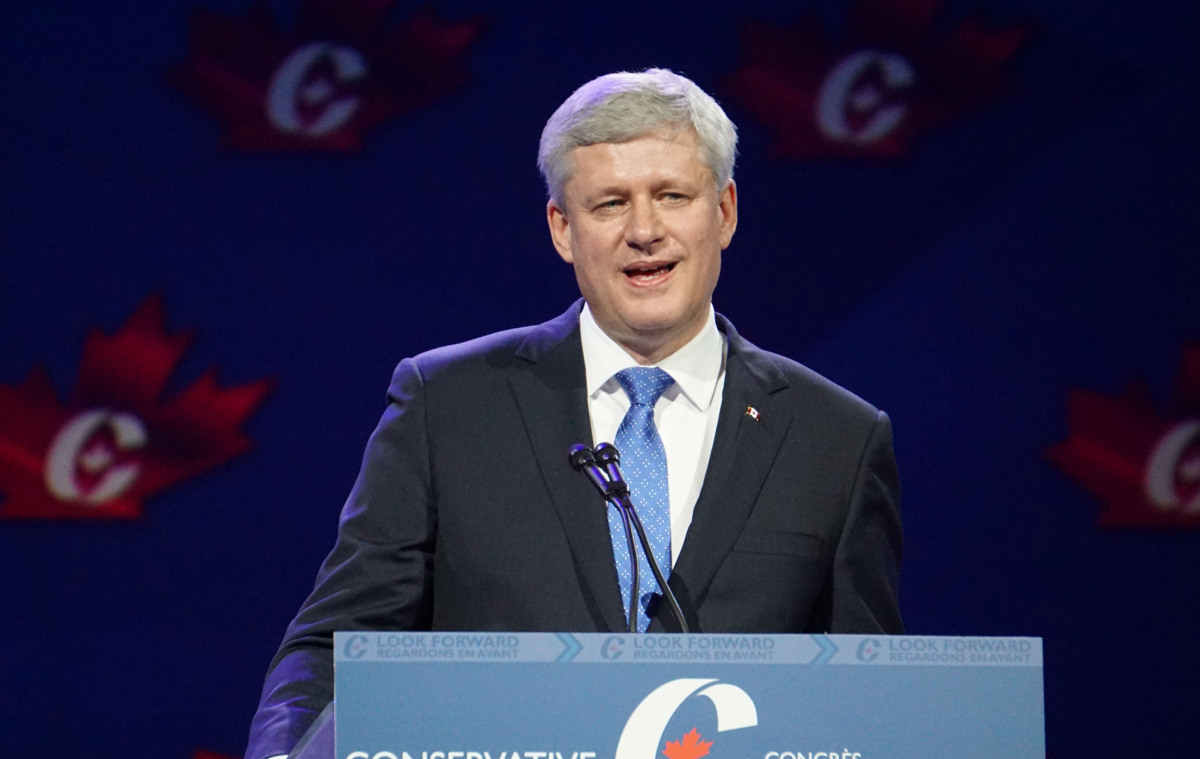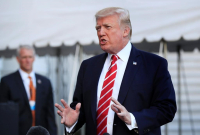Support strong Canadian climate journalism for 2025
Stephen Harper broke his public silence on current events by offering a gloomy assessment on the state of international trade, describing anti-trade sentiment in the U.S. as a long-term problem that predates the Trump administration, that lacks an easy fix, and could well result in the end of NAFTA.
Harper stepped into the role of political analyst during a panel discussion in Washington with a coincidence of timing that bordered on the surreal Wednesday. At the very same moment, Harper's successor, Justin Trudeau, happened to be a few blocks away at the White House, discussing the North American Free Trade Agreement with U.S. President Donald Trump himself.
Powerful anti-trade forces that extend beyond Trump's presidency are at play in American society and aren't going away any time soon, said the former Conservative leader, who's an ardent free trader.
Harper illustrated that with a story about being told by the Bush administration when he took office in 2006 that NAFTA would never have won a vote in the U.S. Congress at that time. He then described how Barack Obama campaigned against the deal. Now he says trade will remain controversial, whether or not Trump cancels NAFTA.
He said he is advising companies to start planning for the possibility of life without NAFTA.
"I believe that it is conceivable. I believe Donald Trump would be willing to take the economic and political risk of that under certain circumstances," Harper said in a panel at the Dentons law firm.
"I would not want to simply bet that this is just all going to work out. What's driving this are some very powerful political currents that, frankly, nobody — including Mr. Trump — has really figured out how to address, and they're going to keep coming at us."
Trudeau, for his part, sounded Wednesday like he was fearing a similar conclusion: "We are ready for anything and we will continue to work diligently," the current prime minister told reporters, after meeting Trump.
Harper said he doesn't believe a simple fix to NAFTA, with a few tweaks, will satisfy Trump. He called the president unpredictable, but said one thing is predictable — the political need for Trump to point to significant changes, given that he's repeatedly blasted NAFTA as a horrific deal: "I just don't know how you get from here to there," Harper said.
He said he understands anti-trade frustration.
Harper described his own annoyance at spending his 50th birthday signing a bailout package for General Motors Canada, only to see the auto giant later move jobs out of the country.
"I'm not your average assembly-line worker, but even I was irritated by that."
And while he proudly touts the fact that he signed trade agreements with dozens of countries, he not only sympathizes with people who feel they've been left behind by the modern economy — he agrees with them.
Harper said frustrated Americans can't blame Canada for this problem, or even Mexico, or possibly even trade deals in general — but he said there's little doubt jobs have moved away, especially to China.
"I've looked at the data," Harper said.
"These people do not (just) perceive they have been left behind. They actually have been left behind... It's a reality."
He said he wanted to avoid opining too much on current politics, so he declined to discuss possible solutions to these problems. He also declined an interview request later. He offered one piece of advice, albeit in vague terms: He urged other parties to try seeing the issue through the U.S. government's eyes, and finding solutions it can sell.
Another panellist was slightly more optimistic.
Newt Gingrich — a fixture of American politics and friend of the president — suggested Trump doesn't really want to end NAFTA. He said he thinks a deal can eventually be reached, after long and difficult negotiations.
"My hunch is in the end we will get to a reformed NAFTA. We will not get to the end of NAFTA," said the former House speaker and Trump campaign surrogate.
"I don't think there's an appetite for blowing it all up, other than the president's occasional tweets... I think it''ll be a brawl (though)." He suggested the deal might get a new name: "It will probably be something like the Modernized Dramatically Improved 21st Century Trumpized NAFTA."
Gingrich prefaced his remarks by saying the president is unpredictable, so nobody knows for sure.
Harper, meanwhile, also offered opinions on two other international relationships. He said Canada could easily strike a trade agreement with a pro-Brexit British government. He also said that if NAFTA collapses, the Chinese will be ready and willing to make a deal with Canada.
His sense of pessimism was underscored later at the same event. Trump's commerce secretary Wilbur Ross addressed the same panel, and said the president is prepared to maintain NAFTA, split it into two bilateral deals, or walk away.
He brushed off questions about protectionist U.S. proposals. For instance, the U.S. has proposed Buy American rules that would restrict public contracts to a dollar-for-dollar basis with other countries, which is stricter than what non-NAFTA countries enjoy.
Ross said the neighbouring countries should be happy. The U.S. is offering a one-for-one arrangement, when the ratio of its market to Canada's is 10 to 1, Ross said: "It's very fair." He also insisted against some evidence that the U.S. runs a trade deficit with Canada.
Harper smiled and took notes during Ross's presentation.





Comments